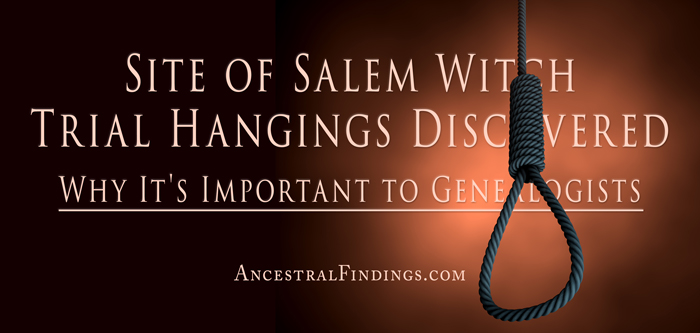Are you interested in the history of the Salem witch trials of 1692? Do you wonder if you have a genealogical connection to any of the people involved in it? It's a unique distinction since not everyone in New England was involved. If you have an ancestor whom you can somehow connect to Salem Village of Danvers, you may have a witch trials connection.
The town of Salem was not the exact location of the witch trials. Though the trials bear the name of the town, it was neighboring Salem village where the witch trials occurred. Today, Salem Village is known as Danvers, and you will find several original buildings and sites associated with the trials there.
Any ancestor who lived in Danvers or its earlier incarnation as Salem Village may have parents, grandparents, great-grandparents, or other more distant direct ancestors who lived there and were involved in the witch trials. Keep tracing the line back, and you may discover a name associated with the witch trials.
When it comes to witch trials genealogy, there are two groups you should concentrate on: the accused witches and the accusers. Sometimes, you might find that you have direct ancestors in both groups. There were dozens of people in both groups as well. However, only 19 people were executed for witchcraft. All but one of these people were hanged, while the remaining one was pressed to death because he would not plead guilty or not guilty.
The pressing was meant to force a pleading, but Giles Cory refused to plead, knowing if he did, the town would take his property and his children could not inherit it. His wife, Martha, was hanged for witchcraft a few days before he was pressed. The names of all of those who were executed are now on benches on a memorial in the town square in Salem proper. If you find you are descended from someone who was executed for witchcraft, you are in a very unique group.
The vast majority of people who were accused of witchcraft were never executed for it. Many of them plead guilty, knowing they would be spared if they did so (only those who insisted they were not guilty were executed). Others stayed in jail until the witch mania was over, and the town realized its mistake; these people were then set free.
Not everyone who was accused or an accuser left descendants, and some of them disappeared from history altogether. Abigail Williams, one of the original group of girls who began the accusations that started the trials, disappeared from Salem Village as a teenager, and no record of her has been found after she departed from the town. But plenty of people did leave descendants. If one of your ancestors was an accused or an accuser, you are part of one of the most notorious and intriguing periods in American history, one with a cause that is still being debated today.
If you discover a possible connection to someone involved in the witch trials and want to investigate it further, or if you know you are descended from someone involved and want to learn more about the person, many resources are available to you.
In the town of Salem, the Peabody-Essex Museum has the original handwritten transcripts from the witch trials, where you can read the actual words that were spoken at the trials and who said them. You will also find artifacts, such as items that belonged to both the accused and the accusers, letters to other towns inquiring about the whereabouts of suspected witches, and even letters to the King of England asking him to intervene in the proceedings so the witch madness would stop. This museum is one of the foremost places for research on the Salem witch trials in the country.
The Bloodlines of Salem website has some good information on the trials, as well as a section on notable descendants of the accused and the accusers. About.com has a site full of links to good resources on witch trial genealogy. You can also check the family trees of the accused and the accusers on Ancestry.com and trace them far backward in time or all the way forward in time with ease.
In addition, there is a lineage society you can join based on your descent from someone who was accused. The name of the society is The Associated Daughters of Early American Witches. Not many people qualify for membership, so if you have a witch trials-accused ancestor and you're a woman, be sure to get your paperwork in and display your credentials proudly.
The Salem witch trials are still very much a part of American identity. They are an event that has never been forgotten and lives on in the national imagination. Discover your own witch trial ancestry and know you are part of something incredibly tragic and fascinating at the same time, something that will never be forgotten.


